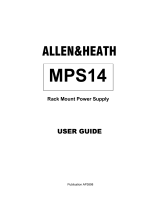Page is loading ...

System Release Notes
Server HX4000 System Release Notes
These System Release Notes provide the latest available release information.
Adaptec is a registered trademark of Adaptec, Inc.
NetWare is a registered trademark of Novell, Inc.
Windows NT is a registered trademark of Microsoft Corporation
All other trademarks are the property of their respective owners.

khkh

1
System Release Notes
Introduction
These system release notes cover the following topics:
■
Restrictions
■
Network Operating Systems(NOS) specific solutions.
Restrictions
Restrictions apply to BIOS:
Version 5.12.E.0072
and System Configuration Utility:
Version 1.07
This restriction will be removed in a later revision of
the BIOS, SCU, or drivers:
■
When installing the Adaptec AHA3940 SCSI
Adapter, a hard disk drive must be attached. A
configuration mismatch error will occur at the end
of POST, if a hard drive is not attached.
■
The Console Redirect Port Option in BIOS Setup is
not supported and should always be set to
“Disabled.”
■
If the CMOS Clear jumper is set to “Enabled,” an
“EISA Configuration NVRAM bad” message is
displayed. Move the CMOS Clear jumper to
“Disabled” and run the SCU to clear the message.
■
When 4GB of memory is installed and a PCI board
that uses memory space is installed or removed, a
“Memory Configuration Error” is displayed. Run the
SCU to clear this message.

2
System Release Notes
Operating System Specific Solutions
NOS specific information below is key installation
information for those NOS’s covered in the
Configuration Guide.
Windows NT 4.0
Your system has been comprehensively tested with
Service Pack 3 applied to Windows NT 4.0.
When installing Windows NT 4.0, consider the
following items:
■
To configure the AIC-7880 when installing Windows
NT, see the Network Operating System
Configuration Guide.
■
When installing Windows NT SMC drivers, do not
run EZSTART on the SMC Super Disk. If doing the
initial Windows NT install, select “Have Disk”
instead of “Start Search” during network install and
insert the SMC Super Disk. If adding the driver on
a system with Windows NT installed, select Control
Panel, Network, Adapters, Add Have Disk and
insert the SMC Super Disk.
■
When configuring COM1 and/or COM2 do not use
Windows NT Control Panel - Ports to verify settings
as Control Panel sometimes reports erroneous
settings. Use instead Windows NT diagnostics or
BIOS Setup to verify COM1 or COM2 Settings.

3
System Release Notes
NetWare 4.11
Your system has been comprehensively tested with file
MPS14.PSM dated 12/10/96 applied to NetWare 4.11.
This file is in IntraNetWare Support Pack v2.0 from
Novell or it can be downloaded from the NetWare
website
When installing NetWare 4.11, consider the following
items:
■
When installing NetWare 4.11, the AIC7880.DSK
driver that is included on the Novell CD-ROM
should be used instead of the driver from the
Adaptec Version 1.3 Family Manager diskette
shipped with your system.
■
The following warning message may be displayed if
you are installing NetWare 4.11 with 4 GB drives:
“Active partition is only 1.8 MB. Do you wish to
continue?” You can ignore this warning and
continue.
■
To install and run ARCserve backup software under
Novell, you must down load several patches and
NLM’s from the Cheyenne website.
■
During the LAN board driver installation, the “load
SMCPWR slot numbers” message requires you to
enter the logical slot number of the LAN boards in
your system. Table 1 provides a cross reference
between your server’s physical PCI slot locations
and the “load SMCPWR slot number” entry required
during the driver installation procedure. Figure 1
illustrates the system board showing PCI locations.

4
System Release Notes
Table 1. “load SMCPWR” Slot Numbers
P02 EISA #2
P05 PCI #00
P03 EISA #3
P01 EISA #1
P04 EISA #4
P07 PCI #10
P06 PCI #01
P08 PCI #11
P09 PCI #12
P10 PCI #13
+
/
